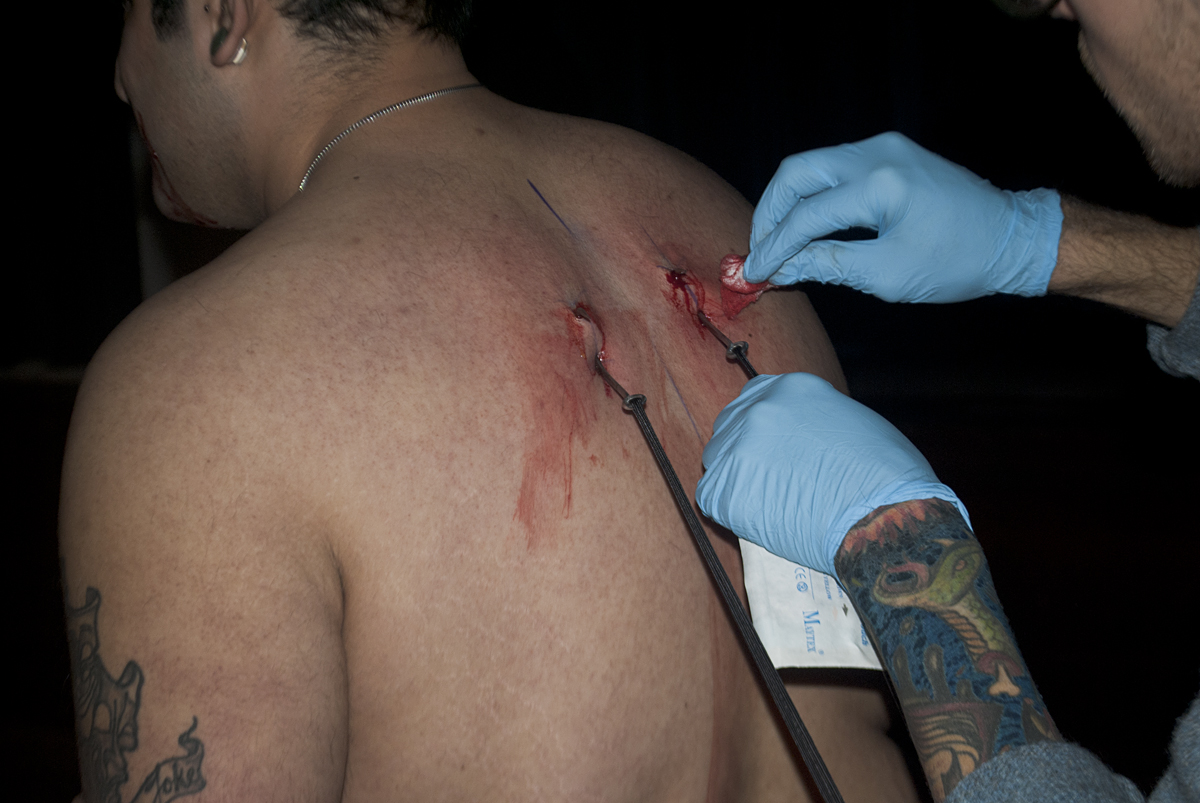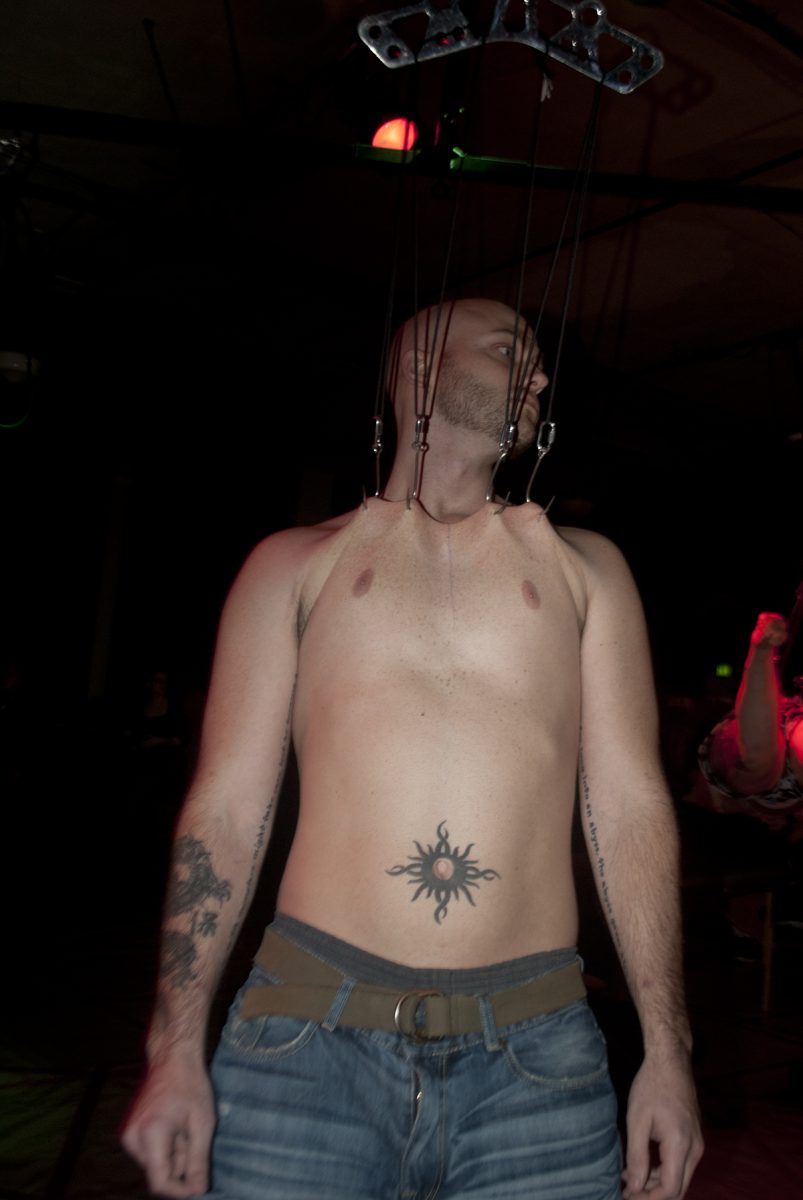Story by Adeline Bash
Photos by Max Barkley
Humans have an innate connection to one another’s pain. They connect the discomfort of others to their own and cannot help but picture themselves in the agonizing position. Only when the mind focuses elsewhere, can an onlooker be relieved of equating the pain of others with their own.
But how do you react when what you perceive as extreme pain is actually being experienced as pleasure?
This sensation happened to the many who witnessed body modification, or “body play”, at the High Priestess Piercing group HPP Hooks’ annual One Eleven Project that took place Tuesday at WOW Hall in downtown Eugene.
The event, which in only three years has become the largest show of its kind on the West Coast, brought together people from across the country to take part in activities that most perceive as torture. From cheek spearing (voluntarily spearing large needles through one’s cheeks) to the more popular suspension (suspending one’s body above the ground from hooks inserted deep into the skin) the participants blurred the lines between pleasure and pain and pushed themselves to their limits – both mentally and physically.
“It was something I wanted to do to test myself, do something out of the box or outside of my comfort zone,” says Angelo Villafane, who took part in cheek spearing and an energy pull (attaching a rope into the skin through metal hooks and pulling against the resistance of either someone holding the other end or the weight of another energy puller). The experience for Angelo, whose new to body play, was simply “intense.”
For Jared Hill, co-organizer of the event, the attraction of body play is the return to one’s most basic sensations and emotions.
“The primal feeling in pain, anxiety, happiness, joy; it’s all an endorphin rush,” Hill says, comparing it to skydiving or other extreme sports. People are inherently attracted to things that create “a sense of suffering to make something worth it in their life,” he adds.
Krystle Smith of Canyonville, Oregon, had similar sentiments, saying suspension has allowed her to heal and let go of things from her past.
“The physical pain blocks the mental,” she says while hanging peacefully four feet above the ground through the twelve hooks lining her back. “It feels good, almost a euphoric feeling.”
Smith was drawn to suspension through of her interest in piercing. Though it lacks the jewelry and commemorative piercings, suspension has its own lasting effects since it does not end when the hooks are removed.
“It stays with you,” she says, “emotionally and spiritually it stays with you forever.”
Suspension differentiates itself from other forms of physical modification that are used to overcome mental struggles. According to Smith, self-mutilation through cutting scars you and is a solitary act. Suspension is a community event that connects people on an entirely different level.
“It wouldn’t be the same without the people,” she says as two High Priestess employees watch over her, ensuring that she is comfortable and feels safe.
The community support was obvious throughout the event as onlookers cheered on participants as they hoisted their bodies into the air, and whispered words of encouragement as piercers punctured their skin.
Another organizer of the event, Georg Birns says the suspension community in Eugene lost its connection to body play for a few years.
The One Eleven Project began in Eugene in the mid-1990s with the suspension performance group Transcend. Gatherings were much more intimate and took place at local homes during the summer involving suspensions over outdoor pools filled with rose petals and candles. But as interest grew from Portland and the surrounding areas, the event grew and, for Birns, lost a lot of its validity.
Safety precautions were ignored, drugs and alcohol became more common, and it began to attract participants who came more for the sensationalism and controversy of suspension than the experience itself, Birns says.
“It was sensationalized for a few years,” he adds. We took it back.” Now events like the One Eleven Project are available for those who, Birns explains, are “looking for a transcendental state they cannot get anywhere else.”
So with the help of Hill, Birns broke away from Transcend, started HPP Hooks, and re-established the legitimacy of the event by closely following safety precautions and by being more selective about who they allow to participate.
“[Body play] takes a lot of trust,” Birns says, stressing the need for participants to look out for one another. “We have a higher success rate than most performing groups because we know the people we are suspending.”
Hilary Whitmore combines opera singing and suspension with California performance group Operafication Suspension, says this upping of standards for suspension is happening across the industry.
“People are taking an active interest in making it cleaner and safer,” she says. “The community as a whole is trying to make suspension more legitimate.” As suspension groups take more safety precautions, Whitmore hopes the rest of society will follow suit and begin to take body play more seriously.
For Josh Beckler of San Jose, California, merging his identity in the suspension community with the performance group “As Seen On TV” with his day-to-day life is complicated. A corporate executive, Beckler doesn’t expect his co-workers to understand the elevation he feels from suspension, which he’s done nearly thirty times over the past eight years.
“They sometimes notice blood coming through my white collard shirts,” he says. Apart from that, he keeps his hobby hidden.
But perhaps the emergence of the underground culture of body play into everyday life is not actually that far-fetched. The acts themselves are, from an outside perspective, hard to conceptualize. But what participants are most attracted to – finding a community of like-minded individuals, overcoming fears, and putting mind over matter – are actually the experiences and emotions that we all deal with every day.
“It’s like anything else in life,” Beckler says. “The whole experience is one big battle, questioning yourself then overcoming it.”









